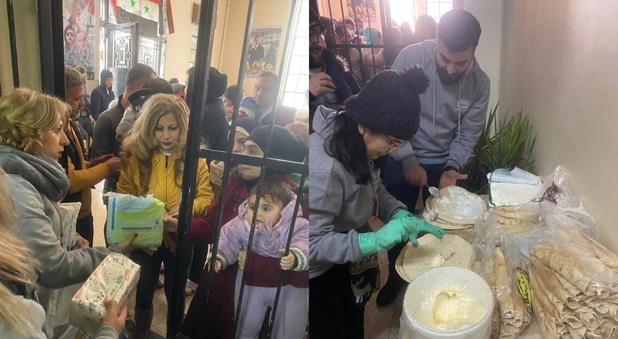On the morning of February 6 a magnitude 7.8 earthquake caused widespread destruction and death across southern central Türkiye and northwestern Syria. On the same day, a 7.5 magnitude aftershock hit Türkiye less than 100 kilometres to the north.
Within moments of the news breaking, teams of Christian volunteers from local churches sprang into action. Church buildings became operations centres, Christians opened their homes, and the support work began.
“The first thing we did was try to arrange some vehicles,” says Jennifer* in a video shared with supporters of the Anglican Relief and Development Fund Australia (ARDFA), adding that the first team with supplies was sent out a day later. “Our priorities were, first of all, food, water and warming items like socks, blankets, jackets, sleeping bags – anything – as they had fled their houses.
“Once [people] get to places that we’ve arranged, we provide them with basic needs like food and clothing. We spend time with them, we eat with them, sometimes we cry together and we pray together.”
The death toll from the quakes has topped 50,000, and more than 1.5 million displaced people are living in temporary shelters. ARDFA is supporting eight teams across Türkiye that actively assess and provide for the immediate needs of victims in major cities, and also villages that are hard to access. Video footage shows vans carrying donations travelling along windy roads laden with snow.
“The advantage of partnering with in-country church partners in Syria and Türkiye is that these churches already have the networks, the volunteers, the resources and the experience [from the 1999 earthquakes] to deliver aid and relief in a timely and effective way,” says Lucy Lim, the executive director of ARDFA.
“They can reach the areas that other foreign aid cannot, or have trouble reaching.
"Importantly, they are delivering aid and relief to all, generously, selflessly and without discrimination, because of their faith in Jesus. This is an active testimony to the grace of God.”
Feeding displaced families a priority
Anglican Aid, through its links to churches in Syria, has been providing unique support in areas that many international aid organisations are having difficulty reaching due to politics and heavy sanctions.
“Food hampers are needed more than anything else,” says Samir Yacco, leader of Damascus Church Aid, a ministry of the churches in that city. He and his team are working with Anglican Aid to provide emergency food and clothing to vulnerable people through the local church.
Local Syrian churches are also being used as distribution centres where possible, although some have suffered terrible damage. Anglican Aid hopes to offer some of the appeal donations to assist with repairs so these churches can continue to operate and support their communities.
Working with in-country church partners has a number of advantages, as it mobilises locals who understand the context and has fewer overhead costs, so every dollar donated can offer greater help.
‘These Christians are very strange people. They seem to enjoy helping us’.
Says Jennifer: “One of our team overheard people saying, ‘These Christians are very strange people. They seem to enjoy helping us’. Another report we got from our first team is [that] people have begun to be interested in Christians and in Christ. They have started to ask questions. Our team was able to share the gospel [with those who asked] and build relationships.”
Two ways you can help
Pray for the volunteers on the ground, for the local churches providing supplies and support, for aid organisations such as ARDFA and Anglican Aid, and for the families processing the grief and trauma of the initial earthquakes and the ongoing aftershocks. Canon Sandy Grant, Dean of St Andrew’s Cathedral, has written a prayer here.
Please also give generously to the appeals supporting Christians on the ground in Türkiye and Syria:
Anglican Aid’s Syria Earthquake Relief helping Syrians access critical food supplies
*Name changed for security purposes






















